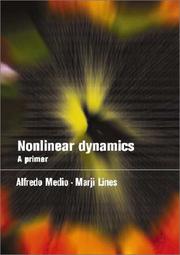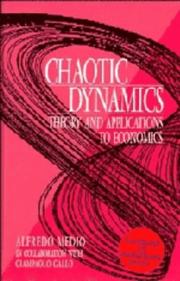| Listing 1 - 5 of 5 |
Sort by
|

ISBN: 0521558743 0521551862 0511016042 0511154739 0511053258 0511555717 0511754051 0511116284 1280151935 9786610151936 1107112788 9780511016042 0511038011 9780511038013 9780511116285 9780511754050 9780511053252 9780511154737 9781280151934 6610151938 9780521551861 9780521558747 9781107112780 9780511555718 Year: 2001 Publisher: Cambridge ; New York : Cambridge University Press,
Abstract | Keywords | Export | Availability | Bookmark
 Loading...
Loading...Choose an application
- Reference Manager
- EndNote
- RefWorks (Direct export to RefWorks)
A systematic and comprehensive introduction to the study of nonlinear dynamical systems, in both discrete and continuous time, for nonmathematical students and researchers working in applied fields. An understanding of linear systems and the classical theory of stability are essential although basic reviews of the relevant material are provided. Further chapters are devoted to the stability of invariant sets, bifurcation theory, chaotic dynamics and the transition to chaos. In the final two chapters the authors approach the subject from a measure-theoretical point of view and compare results to those given for the geometrical or topological approach of the first eight chapters. Includes about one hundred exercises. A Windows-compatible software programme called DMC, provided free of charge through a website dedicated to the book, allows readers to perform numerical and graphical analysis of dynamical systems. Also available on the website are computer exercises and solutions to selected book exercises. See www.cambridge.org/economics/resources
Operational research. Game theory --- Differentiable dynamical systems. --- Nonlinear theories. --- Differentiable dynamical systems --- Nonlinear theories --- Mathematics --- Physical Sciences & Mathematics --- Geometry --- 515.352 --- Nonlinear problems --- Nonlinearity (Mathematics) --- Calculus --- Mathematical analysis --- Mathematical physics --- Differential dynamical systems --- Dynamical systems, Differentiable --- Dynamics, Differentiable --- Differential equations --- Global analysis (Mathematics) --- Topological dynamics --- Dynamique différentiable --- Théories non linéaires --- Systèmes dynamiques --- Business, Economy and Management --- Economics --- Dynamique différentiable --- Systèmes dynamiques --- Théories non linéaires

ISBN: 0521394880 9780521394888 Year: 1993 Publisher: Cambridge [England]: Cambridge university press,
Abstract | Keywords | Export | Availability | Bookmark
 Loading...
Loading...Choose an application
- Reference Manager
- EndNote
- RefWorks (Direct export to RefWorks)
Statics and dynamics (Social sciences) --- Economics, Mathematical. --- Differential equations, Nonlinear. --- Chaotic behavior in systems. --- Statique et dynamique (Sciences sociales) --- Equations différentielles non linéaires --- Equations différentielles non linéaires --- Quantitative methods (economics) --- Programming --- Economics, Mathematical --- Differential equations, Nonlinear --- Chaotic behavior in systems --- Statics and dynamics (Social sciences). --- Mathématiques économiques --- Chaos --- Dynamics and statics (Social sciences) --- Equilibrium (Social sciences) --- Economics --- Mathematical economics --- Nonlinear differential equations --- Chaos in systems --- Chaos theory --- Chaotic motion in systems --- Mathematics --- Social evolution --- Social sciences --- Sociology --- Econometrics --- Nonlinear theories --- Differentiable dynamical systems --- Dynamics --- System theory --- Methodology
Book
Abstract | Keywords | Export | Availability | Bookmark
 Loading...
Loading...Choose an application
- Reference Manager
- EndNote
- RefWorks (Direct export to RefWorks)
Digital

ISBN: 9788847007253 Year: 2008 Publisher: Milano Springer Milan
Abstract | Keywords | Export | Availability | Bookmark
 Loading...
Loading...Choose an application
- Reference Manager
- EndNote
- RefWorks (Direct export to RefWorks)
Macroeconomics --- Economic order --- Finance --- Business policy --- Computer science --- industrie --- informatica --- economische systemen --- macro-economie --- financiën
Multi

ISBN: 9788847010833 Year: 2009 Publisher: Milano Springer Milan
Abstract | Keywords | Export | Availability | Bookmark
 Loading...
Loading...Choose an application
- Reference Manager
- EndNote
- RefWorks (Direct export to RefWorks)
The purpose of the science of complexity is to provide, if not a unified approach, at least useful tools to tackling complex problems in various scientific domains. Generally, complexity is considered a fundamental challenge to the reductionist approach in science as a whole and to its ideas of certainty and randomness. The overall behaviour of a complex system is different from and more than the sum of its parts. The behaviour of non-linear complex systems depends on the interaction (often with retroactive effects) among its constituent parts and not so much (or not only) on the characteristics of these parts themselves; the sum of the behaviour of single parts does not necessarily provide us with an explanation of the aggregate behaviour of a system. All this is true for economic systems. These are based on the activities of single economic agents. Each individual can obtain only partial knowledge that is focussed around its "world" (local information) and react to external shocks in different ways (local rationality). The aim of this book is to provide an overview to recent developments in theory and empirical research that view economic systems as complex phenomena whose aggregate dynamics can often not be inferred from its microscopic (microeconomic) building blocks. The collection of papers represented in this volume is dedicated to the memory of Massimo Salzano, who has been a fervent and eloquent advocate of the complexity approach. The contributions have been presented at a conference held to celebrate Massimo's 60th birthday (Ecople -Economics: From Tradition of Complexity, Capri, 2-4 June, 2006), one year before he unexpectedly passed away in 2007.
Social psychology --- Economics --- Operational research. Game theory --- Computer science --- sociale psychologie --- economie --- informatica --- speltheorie
| Listing 1 - 5 of 5 |
Sort by
|

 Search
Search Feedback
Feedback About UniCat
About UniCat  Help
Help News
News